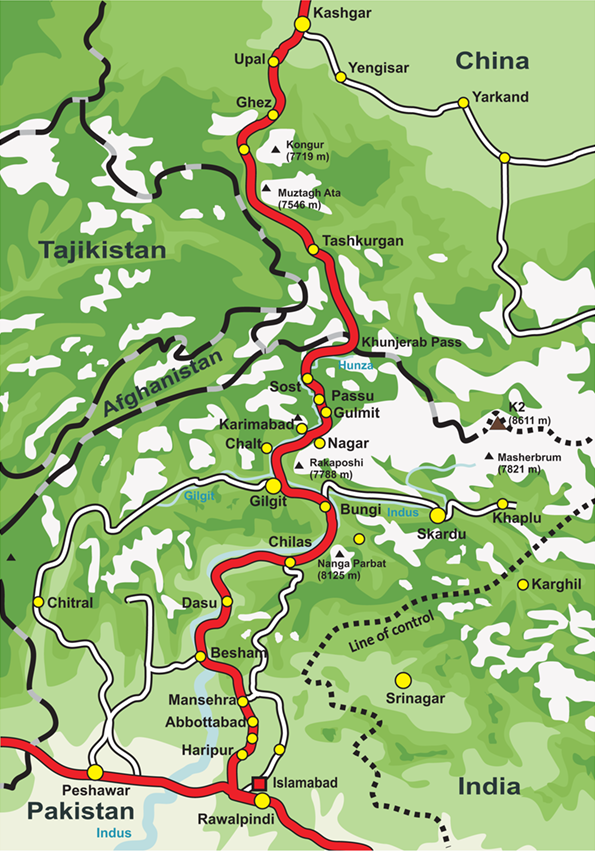|
Jalalabad, Gilgit
Jalalabad ( ur, ) is a small village of Gilgit District in Pakistan, located around 20 km east of Gilgit city. The village has a population of 5,000 households and approximately 40,000 residents. All of the inhabitants are Shia Muslims. The Bagrote River is the source of irrigation and the village's own powerhouse provides electricity. During the 1940s, people from Bilchar Valley, with the help of the British Indian Government, created water canals and established an irrigation system. It is predominantly agricultural land. There are two separate government high schools for boys and girls, Al-Mustafa Public School for both boys and girls. There are a large number of primary and middle schools. The literacy rate is approximately 96%. The village was the major victim of sectarian violence in 1988, when extra-regional forces consisting of thousands of armed militiamen under the command of General Zia Ul Haq and the Government ruined this village, burned houses, killing man ... [...More Info...] [...Related Items...] OR: [Wikipedia] [Google] [Baidu] |
GILGIT-BALTISTAN
Gilgit-Baltistan (; ), formerly known as the Northern Areas, is a region administered by Pakistan as an administrative territory, and constituting the northern portion of the larger Kashmir region which has been the subject of a dispute between India and Pakistan since 1947, and between India and China from somewhat later.The application of the term "administered" to the various regions of Kashmir and a mention of the Kashmir dispute is supported by the tertiary sources (a) through (d), reflecting due weight in the coverage. Although "controlled" and "held" are also applied neutrally to the names of the disputants or to the regions administered by them, as evidenced in sources (e) through (g) below, "held" is also considered politicized usage, as is the term "occupied," (see (h) below): (a) (subscription required) Quote: "Kashmir, region of the northwestern Indian subcontinent ... has been the subject of dispute between India and Pakistan since the partition of the Indian ... [...More Info...] [...Related Items...] OR: [Wikipedia] [Google] [Baidu] |
Gilgit
Gilgit (; Shina: ; ur, ) is the capital city of Gilgit–Baltistan, Pakistan. The city is located in a broad valley near the confluence of the Gilgit River and the Hunza River. It is a major tourist destination in Pakistan, serving as a hub for trekking and mountaineering expeditions in the Karakoram mountain range. Gilgit was once a major centre for Buddhism; it was an important stop on the ancient Silk Road, and today serves as a major junction along the Karakoram Highway with road connections to China as well as the Pakistani cities of Skardu, Chitral, Peshawar, and Islamabad. Currently, it serves as a frontier station for the local tribal areas. The city's economic activity is mainly focused on agriculture, with wheat, maize, and barley as the mainly-produced crops. Etymology The city's ancient name was ''Sargin'', later to be known as ''Gilit'', and it is still referred to as ''Gilit'' or ''Sargin-Gilit'' by the local people. The native Khowar and Wakhi-speaking ... [...More Info...] [...Related Items...] OR: [Wikipedia] [Google] [Baidu] |
GILGIT
Gilgit (; Shina: ; ur, ) is the capital city of Gilgit–Baltistan, Pakistan. The city is located in a broad valley near the confluence of the Gilgit River and the Hunza River. It is a major tourist destination in Pakistan, serving as a hub for trekking and mountaineering expeditions in the Karakoram mountain range. Gilgit was once a major centre for Buddhism; it was an important stop on the ancient Silk Road, and today serves as a major junction along the Karakoram Highway with road connections to China as well as the Pakistani cities of Skardu, Chitral, Peshawar, and Islamabad. Currently, it serves as a frontier station for the local tribal areas. The city's economic activity is mainly focused on agriculture, with wheat, maize, and barley as the mainly-produced crops. Etymology The city's ancient name was ''Sargin'', later to be known as ''Gilit'', and it is still referred to as ''Gilit'' or ''Sargin-Gilit'' by the local people. The native Khowar and Wakhi-speaking ... [...More Info...] [...Related Items...] OR: [Wikipedia] [Google] [Baidu] |
Gilgit District
The Gilgit District ( ur, ) is one of the 14 districts of Pakistan-administered territory of Gilgit-Baltistan. The headquarters of the district is the town of Gilgit. According to the 1998 census, the Gilgit District had a population of 243,324. The district includes Gilgit (the capital city), the Bagrot Valley, Juglot, Danyore, Sultanabad, Naltar Peak, and the Nomal Valley. The highest peak in the district is Distaghil Sar , which is the seventh-highest peak in Pakistan and 19th highest in the world. Administration The Gilgit District is divided into three tehsils: * Danyor Tehsil * Gilgit Tehsil * Juglot Tehsil Education According to the Alif Ailaan Pakistan District Education Rankings 2015, the Gilgit District was ranked 35th out of 148 districts in terms of education. In terms of facilities and infrastructure, the district was ranked 67th out of 148. Geography The Gilgit District is bounded on the north by the Nagar District, on the east by the Shigar Distr ... [...More Info...] [...Related Items...] OR: [Wikipedia] [Google] [Baidu] |
Shia Muslims
Shīʿa Islam or Shīʿīsm is the second-largest branch of Islam. It holds that the Islamic prophet Muhammad designated ʿAlī ibn Abī Ṭālib as his successor (''khalīfa'') and the Imam (spiritual and political leader) after him, most notably at the event of Ghadir Khumm, but was prevented from succeeding Muhammad as the leader of the Muslims as a result of the choice made by some of Muhammad's other companions (''ṣaḥāba'') at Saqifah. This view primarily contrasts with that of Sunnī Islam, whose adherents believe that Muhammad did not appoint a successor before his death and consider Abū Bakr, who was appointed caliph by a group of senior Muslims at Saqifah, to be the first rightful (''rāshidūn'') caliph after Muhammad. Adherents of Shīʿa Islam are called Shīʿa Muslims, Shīʿītes, or simply Shīʿa or Shia. Shīʿa Islam is based on a ''ḥadīth'' report concerning Muhammad's pronouncement at Ghadir Khumm.Esposito, John. "What Everyone Needs to Kno ... [...More Info...] [...Related Items...] OR: [Wikipedia] [Google] [Baidu] |
Sectarian Violence (1988)
The 1988 Gilgit massacre refers to the state-sponsored mass killing of Shia civilians in the Gilgit District of Pakistan who revolted against military dictator Zia-ul-Haq's Sunni Islamist regime, responsible for vehement persecution of religious minorities as part of its Islamization program. The massacre was preceded by anti-Shia riots in early May 1988, which were caused by a dispute over the sighting of the moon for Eid al-Fitr after Ramadan between Shia Muslims and Sunni Muslims. Local Sunnis, who were still fasting for Ramadan, had attacked the local Shias who had announced their commencement of Eid celebrations in Gilgit City, leading to violent clashes between the two sects. In response to the riots and revolt against Zia-ul-Haq's regime, the Pakistan Army led an armed group of local Sunni tribals from Chilas, accompanied by Osama bin Laden-led Sunni militants from Afghanistan as well as Pakistan's North-West Frontier Province into Gilgit City and adjoining ... [...More Info...] [...Related Items...] OR: [Wikipedia] [Google] [Baidu] |
Gilgit-Baltistan
Gilgit-Baltistan (; ), formerly known as the Northern Areas, is a region administered by Pakistan as an administrative territory, and constituting the northern portion of the larger Kashmir region which has been the subject of a dispute between India and Pakistan since 1947, and between India and China from somewhat later.The application of the term "administered" to the various regions of Kashmir and a mention of the Kashmir dispute is supported by the tertiary sources (a) through (d), reflecting due weight in the coverage. Although "controlled" and "held" are also applied neutrally to the names of the disputants or to the regions administered by them, as evidenced in sources (e) through (g) below, "held" is also considered politicized usage, as is the term "occupied," (see (h) below): (a) (subscription required) Quote: "Kashmir, region of the northwestern Indian subcontinent ... has been the subject of dispute between India and Pakistan since the partition of the Indian ... [...More Info...] [...Related Items...] OR: [Wikipedia] [Google] [Baidu] |
Khateeb
In Islam, a khatib, khateeb or hatib ( ar, خطيب ''khaṭīb'') is a person who delivers the sermon (''khuṭbah'') (literally "narration"), during the Friday prayer and Eid prayers. The ''khateeb'' is usually the prayer leader (''imam''), but the two roles can be played by different people. The khatib should be knowledgeable of how to lead the prayer and be competent in delivering the speech (''khutba'') however there are no requirements of eligibility to become a khatib beyond being an Adult Muslim. Some Muslims believe the khatib has to be male but women do lead Friday prayers in number of places. Women may be khateebahs. Edina Lekovic gave the inaugural khutba at the Women's Mosque in 2015. See also * Al-Khatib * Khattab * Khutba * İmam Hatip school * Khatib - a MRT train station in Singapore * Khatib In Islam, a khatib, khateeb or hatib ( ar, خطيب ''khaṭīb'') is a person who delivers the sermon (''khuṭbah'') (literally "narration"), during the Friday p ... [...More Info...] [...Related Items...] OR: [Wikipedia] [Google] [Baidu] |
Populated Places In Gilgit District
Population typically refers to the number of people in a single area, whether it be a city or town, region, country, continent, or the world. Governments typically quantify the size of the resident population within their jurisdiction using a census, a process of collecting, analysing, compiling, and publishing data regarding a population. Perspectives of various disciplines Social sciences In sociology and population geography, population refers to a group of human beings with some predefined criterion in common, such as location, race, ethnicity, nationality, or religion. Demography is a social science which entails the statistical study of populations. Ecology In ecology, a population is a group of organisms of the same species who inhabit the same particular geographical area and are capable of interbreeding. The area of a sexual population is the area where inter-breeding is possible between any pair within the area and more probable than cross-breeding with i ... [...More Info...] [...Related Items...] OR: [Wikipedia] [Google] [Baidu] |








